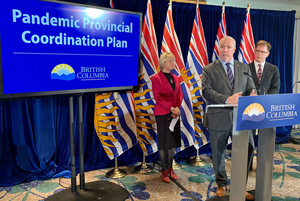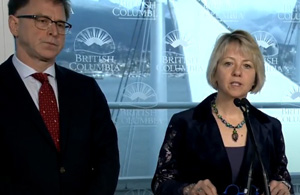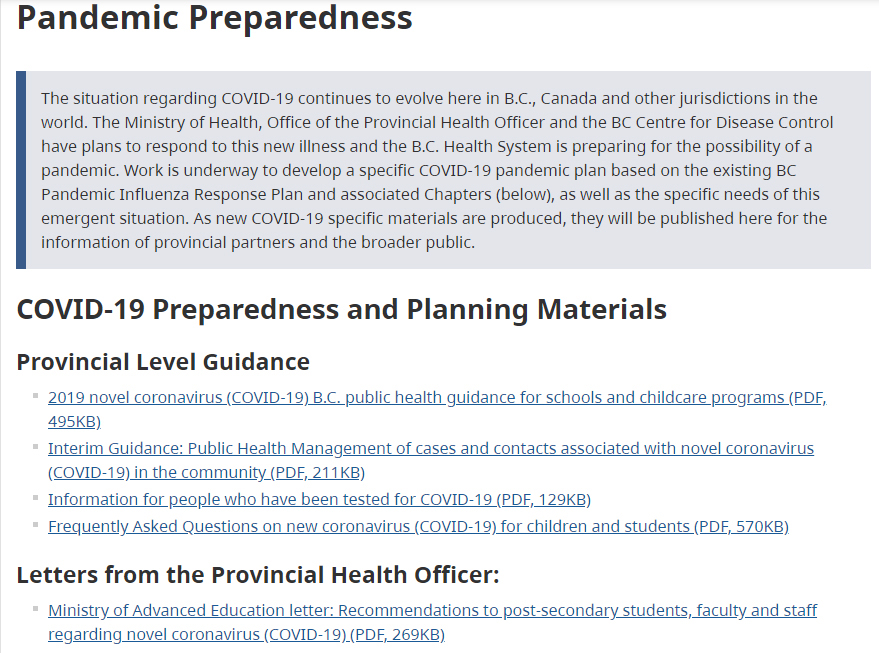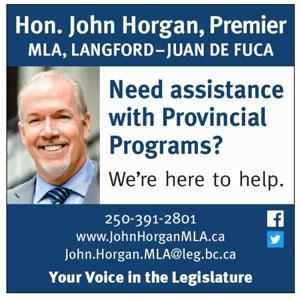
Friday March 6, 2020 ~ BC
by Mary Brooke, B.Sc., Cert PR ~ West Shore Voice News
Today the BC Government provided a lengthy and detailed presentation and public announcement session to media about COVID-19 today Friday March 6.
Including a technical briefing ahead of the televised announcement, the delivery was over two hours long. Media had in-room and telephone access for asking questions. This is evidence of relying upon professional media to deliver accurate and timely information to the public about the new virus for which there is presently no treatment and no vaccine.
Community stakeholders (such as municipalities and school districts) also had access to the call.

The most prominent message from BC Health Minister Adrian Dix and Provincial Health Officer Dr Bonnie Henry about the disease itself was that BC is succeeding with containment of known cases of COVID-19.
As well, it was announced that Premier John Horgan has appointed a deputy ministers’ committee to oversee a whole-of-government approach to implementing the plan, reporting directly to a new cabinet committee that he and Health Minister Adrian Dix will co-chair.
To achieve relatively good containment (i.e. prevent spread) in BC there has been a high level of testing (including if someone just presents for influenza) and a strong degree of messaging about strident self hygiene (i.e. frequent hand washing, not coughing/sneezing near people, using tissues for coughs or sneezes) and self-isolating (i.e. staying home from work, school or gatherings and community events) ‘to a low threshold’ of having any symptoms, so as to avoid possibly spreading the disease to others.
Since January there have been 2,803 test samples on 2,008 individuals. There have also been four additional labs established in BC to test for COVID-19. This increases capacity as well as speeding up the response time for known results. This has helped BC’s health decision-makers to stay ahead of the curve.
BC has also worked hard to prepare the widest spectrum of health care workers and places of treatment and care for prompt isolation of patients who are incoming with respiratory symptoms, and also where tests are done on patients that produce effusion or propulsion of droplets as samples of mucus and fluids are taken.
BC has stockpiled has many respirators as possible, said Dr Henry, to deal with more intensive care of a greater number of patients with COVID-19 should the need arise.
Dr Henry says people should be well-supplied at home for food and anything they might need to take care of themselves or household members if they or others become ill, but generally avoiding against panic-buying of large quantities of supplies. If it comes to the point where food supply chains and supplies of other needs for communities and businesses becomes challenged, there are measures under the Emergency Health Services Act that can be used to enforce some responses on those systems.

There are a number of background documents and recommendations for a wide range of socioeconomic sectors now posted on the BC Government’s Pandemic Preparedness webpage.
Notably, if you have been tested for COVID-19, there is a PDF with information for people who have been tested for COVID-19. First and foremost is to stay home and self-isolate.
For the education sector that includes suggestions and guidance for schools and the child care sector, and post-secondary including students, faculty and staff, and to parents and guardians, and school administrators.
Community guidance is given to the BC public agencies sector and to local governments and indigenous communities. Four areas of recommendation include intergovernmental cooperation, community involvement, employee health, and financial planning. Within that is the key point of understanding the particular strengths and weaknesses of any given community, as well as understanding any vulnerabilities with access to services and a consistent supply of goods.
As for decisions people may be making at this time about travel plans, Dr Henry says people need to decide about their risk tolerance for being caught up in any situation of sudden outbreak or quarantine; would they have the resources and tolerance themselves and are there any scenarios at home that could sustain inattention or neglect.
Dr Henry says conditions are fairly stable in the USA for Canadians to travel, but that international locations probably at this time present more risk. Anyone considering international travel should consult the federal government Travel Advice and Advisories website where destinations canb be searched by these criteria:
- local safety and security conditions and areas to avoid
- entry and exit requirements
- local laws and culture
- possible health hazards and health restrictions
- natural hazards and climate
- where to find help while you are travelling abroad
As for decisions about local small gatherings, Dr Henry says that if anybody is ill they should not go. For anyone who does attend gatherings, they are to make sure to “do those things that prevent transmission” such as washing their hands, not touching their face, and covering coughs. For anyone who has an existing illness or concerns about severe illness, “now would be a time to avoid those larger gatherings,” Dr Henry said today.
Local events in the west shore coming up in the next few weeks include the SD62 information session on March 12 about the two new schools in West Langford, and the Canada Soccer match against Trinidad and Tobago at Westhills Stadium on March 27 and 31. And of course, students across the region will be on spring break starting March 14 through 29, producing many family decisions about both local activities and travel.
On a broader but significant societal note, to protect people in BC against novel coronavirus (COVID-19) and mitigate the impact of this illness on communities, the BC government and the provincial health officer have developed the British Columbia Pandemic Provincial Co-ordination Plan to respond to the evolving outbreak.
The plan is to be ready to operate under an outbreak that lasts up to four months.
Premier John Horgan has appointed a deputy ministers’ committee to oversee a whole-of-government approach to implementing the plan, reporting directly to a new cabinet committee that he and Health Minister Adrian Dix will co-chair.
“From the first day the world learned of this outbreak, BC’s public health officials have delivered the most robust response of any jurisdiction in this hemisphere. Through this co-ordination plan, we will ensure they have the support they need so we are prepared for all possibilities,” Premier Horgan said today.
=== LINKS
COVID-19 pandemic preparedness and planning materials: https://www2.gov.bc.ca/gov/content/health/about-bc-s-health-care-system/office-of-the-provincial-health-officer/current-health-topics/pandemic-influenza.
Recommendations on protecting yourself and your community, visit: http://www.bccdc.ca/health-info/diseases-conditions/coronavirus-(novel)
For more information and latest updates on COVID-19, follow the BC Centre for Disease Control on Twitter @CDCofBC or visit http://www.bccdc.ca/




